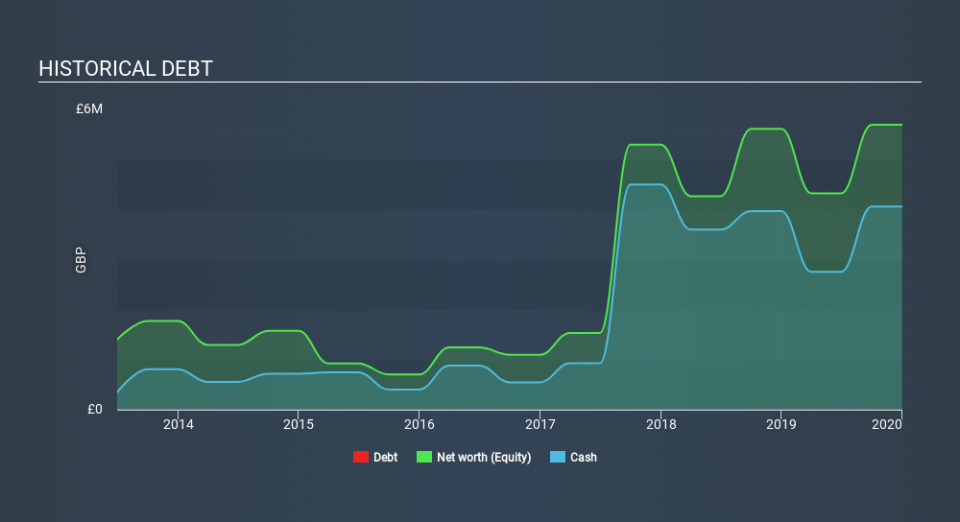Companies Like Greatland Gold (LON:GGP) Are In A Position To Invest In Growth

We can readily understand why investors are attracted to unprofitable companies. For example, Greatland Gold (LON:GGP) shareholders have done very well over the last year, with the share price soaring by 720%. But while the successes are well known, investors should not ignore the very many unprofitable companies that simply burn through all their cash and collapse.
So notwithstanding the buoyant share price, we think it's well worth asking whether Greatland Gold's cash burn is too risky In this report, we will consider the company's annual negative free cash flow, henceforth referring to it as the 'cash burn'. Let's start with an examination of the business's cash, relative to its cash burn.
Check out our latest analysis for Greatland Gold
How Long Is Greatland Gold's Cash Runway?
A company's cash runway is calculated by dividing its cash hoard by its cash burn. As at December 2019, Greatland Gold had cash of UK£4.1m and no debt. In the last year, its cash burn was UK£4.4m. That means it had a cash runway of around 11 months as of December 2019. Importantly, analysts think that Greatland Gold will reach cashflow breakeven in 3 years. Essentially, that means the company will either reduce its cash burn, or else require more cash. Depicted below, you can see how its cash holdings have changed over time.
How Is Greatland Gold's Cash Burn Changing Over Time?
Greatland Gold didn't record any revenue over the last year, indicating that it's an early stage company still developing its business. Nonetheless, we can still examine its cash burn trajectory as part of our assessment of its cash burn situation. Over the last year its cash burn actually increased by a very significant 61%. Oftentimes, increased cash burn simply means a company is accelerating its business development, but one should always be mindful that this causes the cash runway to shrink. Clearly, however, the crucial factor is whether the company will grow its business going forward. For that reason, it makes a lot of sense to take a look at our analyst forecasts for the company.
How Easily Can Greatland Gold Raise Cash?
Since its cash burn is moving in the wrong direction, Greatland Gold shareholders may wish to think ahead to when the company may need to raise more cash. Companies can raise capital through either debt or equity. Many companies end up issuing new shares to fund future growth. By comparing a company's annual cash burn to its total market capitalisation, we can estimate roughly how many shares it would have to issue in order to run the company for another year (at the same burn rate).
Greatland Gold's cash burn of UK£4.4m is about 1.0% of its UK£456m market capitalisation. That means it could easily issue a few shares to fund more growth, and might well be in a position to borrow cheaply.
How Risky Is Greatland Gold's Cash Burn Situation?
On this analysis of Greatland Gold's cash burn, we think its cash burn relative to its market cap was reassuring, while its increasing cash burn has us a bit worried. One real positive is that analysts are forecasting that the company will reach breakeven. Cash burning companies are always on the riskier side of things, but after considering all of the factors discussed in this short piece, we're not too worried about its rate of cash burn. Readers need to have a sound understanding of business risks before investing in a stock, and we've spotted 4 warning signs for Greatland Gold that potential shareholders should take into account before putting money into a stock.
Of course Greatland Gold may not be the best stock to buy. So you may wish to see this free collection of companies boasting high return on equity, or this list of stocks that insiders are buying.
Love or hate this article? Concerned about the content? Get in touch with us directly. Alternatively, email editorial-team@simplywallst.com.
This article by Simply Wall St is general in nature. It does not constitute a recommendation to buy or sell any stock, and does not take account of your objectives, or your financial situation. We aim to bring you long-term focused analysis driven by fundamental data. Note that our analysis may not factor in the latest price-sensitive company announcements or qualitative material. Simply Wall St has no position in any stocks mentioned. Thank you for reading.

